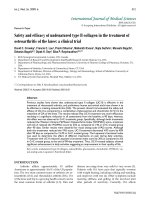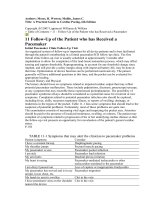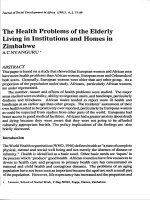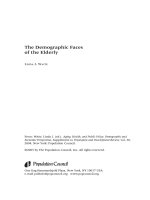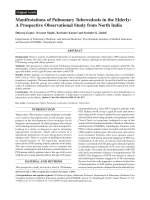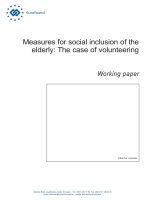ORGANIZATION OF CARE IN PSYCHIATRY OF THE ELDERLY: A TECHNICAL CONSENSUS STATEMENT pptx
Bạn đang xem bản rút gọn của tài liệu. Xem và tải ngay bản đầy đủ của tài liệu tại đây (126 KB, 19 trang )
WHO/MSA/MNH/MND/97.3
Original: English
Distr.: General
PROGRAMME ON MENTAL HEALTH
ORGANIZATION OF CARE IN
PSYCHIATRY OF THE ELDERLY
A TECHNICAL CONSENSUS STATEMENT
DIVISION OF MENTAL HEALTH AND
PREVENTION OF SUBSTANCE ABUSE
WORLD HEALTH ORGANIZATION WORLD PSYCHIATRIC ASSOCIATION
GENEVA
This document has been printed through a generous grant from Pfizer Pharmaceuticals Group.
WHO/MSA/MNH/MND/97.3
ORGANIZATION OF CARE
IN PSYCHIATRY OF THE ELDERLY:
A TECHNICAL CONSENSUS STATEMENT
Division of Mental Health and
Prevention of Substance Abuse
World Health Organization World Psychiatric Association
Geneva, 1997
This is a technical consensus statement on the organization
of care in psychiatry of the elderly, jointly produced by the Geriatric
Psychiatry Section of the World Psychiatric Association and WHO,
with the collaboration of several other NGOs and the participation of
experts from countries in several WHO Regions.
It is the final version of a previous draft issued under
reference MSA/MNH/MND/97.1.
KEY WORDS: psychogeriatrics / elderly people / care / organization
of services / mental health care.
© World Health Organization and World Psychiatric Association 1997
This document is not a formal publication of the World Health Organization (WHO), and all
rights are reserved by the Organization. The document may, however, be freely reviewed,
abstracted, reproduced or translated, in part or in whole, but not for sale or for use in conjunction
with commercial purposes.
WHO/MSA/MNH/MND/97.3
Page i
SERVICES FOR THE ELDERLY WITH MENTAL DISORDERS
I am pleased to support the distribution of this technical consensus statement on the
organization of services for the elderly with mental disorders. It is a second document in a planned
series of three, developed by a group of representatives of non-governmental organizations and the
World Health Organization during a meeting organized by the Geriatric Psychiatry Section of the
World Psychiatric Association and hosted by the Lausanne University Psychogeriatrics Service, held
in Lausanne, Switzerland, 14-16 April 1997.
The importance of this subject is indicated by the number and quality of NGOs who sent
representatives to the meeting and later endorsed the final text. These NGOs include some of the
most relevant organizations interested in this area, and to which we are deeply grateful: Alzheimer's
Disease International (and its local branch, the Swiss Alzheimer Association), the International
Council of Nurses, the International Federation of Social Workers, the International Psychogeriatric
Association, the International Union of Psychological Science, Medicus Mundi Internationalis and
the World Federation for Mental Health.
Our appreciation goes to Professor Jean Wertheimer, Professor of Psychogeriatrics at the
Lausanne University and President of the Geriatric Psychiatry Section of the World Psychiatric
Association, who organized and hosted the meeting; to Professor Raymond Levy, President of the
International Psychogeriatric Association, who chaired the meeting; and to both Dr Nori Graham,
President of Alzheimer's Disease International, and Professor Cornelius Katona, from the University
College London Medical School, who excelled in producing the final report of the meeting. The text
of the statment produced by the meeting has been sent to all member societies of the World
Psychiatric Association for comments. Dr José Manoel Bertolote, from the World Health
Organization's Mental Disorders Control Unit, was responsible for the final editing of this document.
We gratefully acknowledge a grant from Pfizer Pharmaceuticals Group for the printing and
distribution of this document.
It is our hope now that, through the implementation of the principles included in this
document, the lives of the elderly with mental disorders and of their carers will be brighter and
better.
Dr J. A. Costa e Silva
Director
Division of Mental Health and Prevention of Substance Abuse
World Health Organization
WHO/MSA/MNH/MND/97.3
Page ii
INTRODUCTION
I am very grateful to the Section on Geriatric Psychiatry of the World Psychiatric Association
and its Chairman, Professor J. Wertheimer for agreeing to take a leading role in the development
of a consensus of opinion on several issues in the development of health care for the elderly with
mental disorders.
The proportion of the population reaching old age is growing in developed and developing
countries and the resources available to deal with health care for this group of people are becoming
more and more restricted. It is necessary therefore to develop strategies of care that will be both
effective and rational. The first step to their formulation must be an examination of scientific
evidence and a unanimous statement about the most desirable course of action by those most
concerned with the implementation of such strategies - the organizations representing the health
and social service professionals, governmental agencies, patients and non-professional carers.
The Geriatric Section of the WPA has approached this task by inviting representatives of
leading nongovernmental organizations and of the World Health Organization to meet and produce
a draft of three consensus statements - the first dealing with the limits of the field of concern for the
psychiatry of old age, the second addressing the organization of services for the elderly with mental
disorders, and the third presenting views on research and training in relation to the management
of these disorders. The participation of international organizations such as the International
Psychogeriatric Association, Alzheimer's Disease International, the International Federation of
Social Workers, the International Union of Psychological Science, the World Federation of Mental
Health and Medicus Mundi Internationalis made this a truly international effort. The first two texts
produced by this group have been widely circulated to individual experts for comments and
suggestions. In addition, they have been forwarded to the Member Societies of the World Pychiatric
Association in some 80 countries and their views and opinions have also been taken into account
in finalizing the texts. The third text of the series will be produced in early 1998 using the same
procedure.
It is my hope that the other Sections of the World Psychiatric Association will follow the
example set by the Section on Geriatric Psychiatry. The development of consensus statements is
one of the explicitly stated goals of the WPA - a goal that has never been of greater importance for
psychiatry than now at a time when the prevalence of mental disorders is growing worldwide and
when psychiatry has acquired the knowledge and techniques to deal with them in an effective
manner.
Professor N. Sartorius
President
World Psychiatric Association
WHO/MSA/MNH/MND/97.3
Page iii
A CONSENSUS STATEMENT ON THE ORGANIZATION OF
PSYCHIATRIC SERVICES FOR THE ELDERLY
Care of older people suffering from mental disorders is growing in importance, at the same
time as life expectancy is increasing. The latter phenomenon, which is already a significant reality
in developed countries, will progressively end up playing an important role in developing countries
as well. The implications of this increased longevity are widespread and will greatly affect our
society which must adapt itself to the political and socio-economic environment, while at the same
time adhering to rigorous ethics that protect the individuals, whatever their age.
It is with full awareness of the interests at stake, that this consensus statement has been
prepared by representatives of the primary professional organizations concerned with mental health
of the elderly. This document, which is a follow-up of a first Consensus Statement on Psychiatry
of the Elderly, gives the broad outlines of the organization of care for the aged. It is intended to be
sufficiently flexible to allow local adaptations of the basic principles.
Psychiatry of the Elderly is a complex discipline, confronted with intricate problems
pertaining not only to mental health and behavior, but also to physical health and relational,
environmental, spiritual and social matters. The situations which this discipline is facing are thus
closely linked to the family nucleus, the local customs and culture, the general organization of Public
Health and social assistance. The organization of care in Old Age Psychiatry must be worked out
along the perspectives of the Primary Health Care Strategy of the WHO (Declaration of Alma Ata,
1978), focus on the patients and their families, and yet be integrated into the medical and social
network designed for the population in general and the elderly in particular. However, this
integration must not be synonymous with dilution and loss of specificity. On the contrary, since
collaboration is necessary, it is therefore indispensable that competences, specific care and
structures adapted to Old Age Psychiatry, be solidly developed. Care of the elderly requires a
strong contribution from Old Age Psychiatry.
Professor J. Wertheimer
Chairman
Geriatric Psychiatry Section
World Psychiatric Association
WHO/MSA/MNH/MND/97.3
Page 1
ORGANIZATION OF CARE IN PSYCHIATRY OF THE ELDERLY:
A TECHNICAL CONSENSUS STATEMENT
The World Health Organization and World Psychiatric Association have recently produced
a consensus statement on the scope of psychiatry of the elderly
1
. That consensus statement
defines the specialty of psychiatry of the elderly as a branch of psychiatry that forms part of the
multidisciplinary delivery of mental health care to older people. In order to fulfil the scope of
psychiatry of the elderly we need recommendations as to the organisation of care within it.
The objectives of this document are to:
* promote debate at the local level on the mental health needs of older people and their care
givers;
* describe the basic components of care to older people with mental disorders, and their
coordination;
* stimulate assist and review the development of policies, programmes and services in
psychiatry of the elderly according to the framework of the WHO Primary Health Care
Strategy
2
; and
* encourage the continuous evaluation of all policies, programmes and services to older
people with mental disorders.
This document is intended for use by all those involved in the development and
implementation of policies, programmes and services for promoting the mental health of older
people. It is therefore expected that this document will be widely distributed.
1. GENERAL PRINCIPLES
Good health and life of good quality are fundamental human rights. This applies equally
to people of all age groups and to people with mental disorders.
All people have the right of access to a range of services that can respond to their health
and social needs. These needs should be met appropriately for the cultural setting and in
accordance with scientific knowledge and ethical requirements.
Governments have a responsibility to improve and maintain the general and mental health
of older people and to support their families and carers by the provision of health and social
measures adapted to the specific needs of the local community.
1 WHO. Psychiatry of the elderly: a consensus statement. (Doc.: WHO/MNH/MND/96.7). Geneva, WHO, 1996.
2 WHO. Alma-Ata 1978 Primary Health Care. Geneva, WHO, 1978.
WHO/MSA/MNH/MND/97.3
Page 2
Older people with mental health problems and their families and carers have the right to
participate individually and collectively in the planning and implementation of their health care.
Services should be designed for the promotion of mental health in old age as well as for the
assessment, diagnosis and management of the full range of mental disorders and disabilities
encountered by older people.
Governments need to recognise the crucial role of non-governmental agencies and work
in partnership with them.
Preparing for increasing life expectancy and ensuing health risks calls for significant social
innovations at the individual and societal level, which must be founded on a knowledge base drawn
from contributions by, and collaboration among, the medical, behavioural, psychological, biological
and social sciences.
In developing countries it may be difficult to provide resources for the provision of care.
This, however, does not invalidate the aims of helping the elderly by the application of the principles
listed above and the specific principles that follow.
2. SPECIFIC PRINCIPLES
Good quality care for older people with mental health problems is:
Comprehensive
Accessible
Responsive
Individualised
Trans-disciplinary
Accountable
Systemic
A comprehensive service should take into account all aspects of the patient's physical,
psychological and social needs and wishes and be patient-centred.
An accessible service is user-friendly and readily available, minimising the geographical, cultural,
financial, political and linguistic obstacles to obtaining care.
A responsive service is one that listens to and understands the problems brought to its attention
and acts promptly and appropriately.
WHO/MSA/MNH/MND/97.3
Page 3
An individualised service focuses on each person with a mental health problem in her/his family
and community context. The planning of care must be tailored for and acceptable to the individual
and family, and should aim wherever possible to maintain and support the person within her/his
home environment.
A transdisciplinary approach goes beyond traditional professional boundaries to optimise the
contributions of people with a range of personal and professional skills. Such an approach also
facilitates collaboration with voluntary and other agencies to provide a comprehensive range of
community orientated services.
An accountable service is one that accepts responsibility for assuring the quality of the service it
delivers and monitors this in partnership with patients and their families. Such a service must be
ethically and culturally sensitive.
A systemic approach flexibly integrates all available services to ensure continuity of care and
coordinates all levels of service providers including local, provincial and national governments and
community organisations.
3. CARE NEEDS
PREVENTION
There are several specific circumstances within the psychiatry of old age where
preventative strategies may be useful. Vascular dementia may be prevented by appropriate
measures that reduce risk of cerebrovascular accident. These include identification of those at high
risk of CVA (screening for hypertension and atrial fibrillation, early identification and good control
of diabetes), low-dose aspirin and encouragement towards healthy lifestyle (diet, exercise,
nonsmoking). Similarly depression may be prevented by facilitating meaningful social contact and
recognising circumstances that increase individual risk (bereavement, social isolation,
institutionalisation, poverty). Encouraging continued social and intellectual activity in old age may
protect against both depression and dementia. Recognition of impending carer burnout and
provision of appropriate support can prevent crises of care.
EARLY IDENTIFICATION
Early identification of mental disorders of old age (such as depression, dementia, delirium,
delusional disorders, anxiety disorders, alcohol and substance abuse and dependence) may
facilitate access to services and effective management and reduce stress both for the individual and
the carer(s). Abrupt change in behaviour or personality should alert the clinical team to the possibility
WHO/MSA/MNH/MND/97.3
Page 4
of treatable mental disorder. Carers and families are in the best position to recognise such change.
Screening (e.g., MiniMental State Examination for dementia, Geriatric Depression Scale for
depression) may have a role but requires training in true case recognition as well as in
administration of screening instruments.
COMPREHENSIVE MEDICAL AND SOCIAL ASSESSMENT
(INCLUDING DIAGNOSIS)
Wherever possible, initial assessment should be in the individual's home environment. All
care professionals should be trained in comprehensive initial assessment and good record keeping.
The purposes of such assessment are to identify problems (including practical difficulties),
resources and needs (from the points of view of the individual and the care network), to make a
working diagnosis and to generate an initial management plan (which may include further
assessment or specialist referral). A diagnostic formulation is important both to allow rational care
planning and to inform patients and carers as to the current situation, management options and
outlook. Timely referral as appropriate (to hospital specialists, social services, voluntary
organisations etc.) is integral both to the initial assessment and to subsequent management (see
below).
MANAGEMENT
Management is more than treatment in the medical sense. A coherent and comprehensive
care plan should critically review diagnoses and address the individual's physical, psychological,
social, spiritual and material needs as well as specific psychiatric diagnoses. The needs of the carer
network and of the local community must also be addressed. Progress must be monitored in follow-
up and risk of relapse considered. Prophylactic treatment may play an important role. The primary
goal of management is, as far as possible, to maintain or improve the quality of life of patients and
their carers while respecting their autonomy. Quality management also includes special care for
dying persons and their families.
CONTINUING CARE, SUPPORT AND REVIEW OF THE INDIVIDUAL AND CARER(S)
Patients with severe mental illness, particularly those with dementia, may need
considerable support in maintaining self-care and activities of daily living. In some cases continuous
supervision may be necessary. The ability of informal carers to meet these needs, and the resultant
burdens on carers need to be monitored closely and emerging problems addressed promptly.
Practical and regular help with household and personal care may considerably enhance quality of
life. Counselling and emotional support for carers may play a crucial role. A proactive approach
is more efficient as well as more humane than one that is crisis-driven. Emerging physical problems
may require active medical treatment.
WHO/MSA/MNH/MND/97.3
Page 5
INFORMATION, ADVICE AND COUNSELLING
Patients and carers need easy access to readily understandable and accurate information
concerning diagnosis, management options and implications and available support resources.
Educating patients and carers and promoting discussion are important components in care planning
which may facilitate compliance, particularly in the context of long-term prophylaxis. A systematic
multidisciplinary approach to record keeping and information sharing (within the confines of
confidentiality) is highly desirable.
REGULAR BREAKS (RESPITE)
The provision of breaks from caring may be crucial in enabling informal carers to continue
in their caring role. Such respite may take many forms and should be as flexible and responsive
as possible to individual needs and circumstances. Respite may be required at different times of
day or night and may be offered both in the patient's home and in appropriate alternative settings
such as day centres, day hospitals and residential facilities. Using scarce residential facilities for
respite rather than exclusively for continuing care may increase their effectiveness considerably.
ADVOCACY
The legal rights and financial and other personal interests of such patients must be
protected. Some older people with mental disorders (particularly those with dementia) may not be
able effectively to represent their interests, manage their affairs or agree to what is proposed for
them. This is particularly problematic for patients who are alone and where there is a conflict
between individual and family interests. Patient advocates (who have neither a carer nor a service
provider role for the patient concerned) may be important, as may reference to advance directives.
RESIDENTIAL CARE
Though care should be provided in patients' homes as long as possible, it must be
recognised that care in an alternative residential setting may be the only way of meeting patients'
needs effectively or avoiding intolerable carer burden. Such care will always be necessary,
particularly for people who have no relatives available or willing to look after them.
SPIRITUAL AND LEISURE NEEDS
Older people with mental health problems need the opportunity to express and discuss
spiritual needs and observe their religious practices. Meaningful and appropriate recreational and
leisure activities may contribute substantially to quality of life. Appropriate provision and support in
these areas should be considered in both community and residential settings.
WHO/MSA/MNH/MND/97.3
Page 6
4. DESCRIPTORS OF COMPONENTS OF SERVICES
The components of services can be summarised in Figure 1, which portrays the concept
that individual patients, together with family and carers are surrounded by care services; these are
flexibly interlocking, overlapping and integrated to provide an unified system for continuing care and
best possible quality of life. Structural obstacles are minimised, as represented by the dotted lines
of the figure, enabling the smooth movement of the patient from one service component to another
as changing circumstances require.
This section describes the components which can be put into place to address the care
needs described in the previous section.
The following components ideally should be the responsibility of specialised teams of
trained health care professionals working in psychiatry of the elderly. Where there is a scarcity of
trained staff and of resources it will be necessary to use ad hoc solutions in order to provide the
necessary components - while trying to fully develop services.
Figure 1: Surround with care
A
C
D
E
G
F
J
I
H
Community
Family
Individual
Patient
Carers
B
WHO/MSA/MNH/MND/97.3
Page 7
A. Community Mental Health Teams (CMHTs) for Older People
The lead in organising the following components of the service should ideally be taken by
Multidisciplinary Specialist Teams working in psychiatry of the elderly. The CMHT may consist of
doctors, psychiatric nurses, psychologists, social workers, therapists, secretaries. Referral to the
CMHT is usually from primary care. One of the main responsibilities of the CMHT is the specialist
assessment, the investigation and the treatment of people in their home setting. In situations where
such personnel are not available, the responsibility may be taken by general psychiatric or geriatric
medicine teams.
B. Inpatient services
Acute inpatients units need to provide specialist assessment and treatment for the full
range of mental disorders. This may in some cases include rehabilitation before return to the
community.
C. Day hospitals
This is an acute service which offers assessment and treatment to older people who can
be maintained at home supported by the multidisciplinary team. The day hospital team could
include doctors, nurses and therapy staff. Transport may need to be available.
D. Out-patient services
These provide assessment, diagnosis and treatment for people fit enough to live in the
community and get to and from the hospital base. Out-patient services should be close to the in-
and day-patient units. They may involve subspecialty clinics (e.g., memory or mood disorder clinics)
and mobile clinics.
E. Hospital Respite Care
Hospital beds may be used to provide a respite service for people with chronic and severe
mental illness and difficult associated behavioural problems in order to give their carers a break and
enable care at home to continue as long as possible.
F. Continuing Hospital Care
Care for life in a hospital setting may be required for people with chronic and severe mental
illness and difficult associated behavioural problems. Such care should be provided in as relaxed
and homely an environment as possible, with carers encouraged to participate.
WHO/MSA/MNH/MND/97.3
Page 8
G. Liaison Services
Consultations and/or liaison services should be provided between facilities for elderly
people with mental disorders and those serving general and geriatric medicine, general psychiatry,
residential facilities and social agencies. This relationship should be of a reciprocal nature.
H. Primary Care
The primary care team has the initial responsibility for identifying, assessing and managing
mental health problems in older people. The decision to refer to the CMHT is usually made in
primary care.
I. Community and social support services
Services (both formal and informal), to enable the elderly person to remain at home. This
includes a range of activities (home care, day care, residential care, respite care, self-help groups
etc) provided by voluntary or government/social services.
Respite facilities. A range of short term, time limited, in-the-home and out-of the-home services
(residential services, other carers, day programmes) to support the carers.
Residential care. For those patients whose physical, psychological, and/or social dependencies
make living at home no longer possible, a spectrum of residential facilities should be provided.
These range from supported accommodations with low level supervision, medium level care
facilities, to full nursing facilities. These should be organised to achieve the best possible quality
of life.
J. Prevention
The mental health team for the elderly should engage in the prevention of relapse of
disorders by careful follow up. They should also identify the risk factors for mental disorders in the
elderly (e.g. hypertension, alcohol and substance abuse) and ensure these are effectively managed
by appropriate medical, social strategies.
Within each service, preventative activities need to be coordinated in collaboration with
relevant public health and other health care professionals. These may include educational activities
to improve early identification of mental health problems by carers, families and primary care
personnel in the community.
WHO/MSA/MNH/MND/97.3
Page 9
5. CONCLUSIONS
This document is not meant to be either totally comprehensive or prescriptive. Detailed
descriptions of methods of treatment and care, for example, have not been included in this
statement. Treatment and care are consistently evolving in the light of advances in research and
services have to be continuously evaluated to ensure that they follow these advances of knowledge.
New structures may well be required to enable new treatments to be used successfully.
This statement identifies care needs of older people with mental disorders and some of the
ways by which these are currently met in some parts of the world. Where this is not the case, the
consensus is that it is urgent that people responsible for health care policy development and
implementation take note of the requirements cited and act accordingly.
Responsive action should lead to the development, appropriate to local conditions, of the
components of services which will adequately address these needs.
Such components should be integrated and co-ordinated to serve older people with mental
health problems and their carers and should be supported by adequate resources.
The attainment of the best possible quality of life of elderly people with mental disorders and
their carers is paramount and is the ultimate guiding principle in organisation of care.
Good services should always be under-pinned by good research, evaluation and training.
These will be dealt with in subsequent consensus reports, the next of which will discuss exclusively
the question of teaching and training in the specialty of psychiatry of the elderly.
WHO/MSA/MNH/MND/97.3
Page 10
Consensus Meeting on Organization of Care in Old Age Psychiatry
Organized by the World Psychiatric Association, Section of Geriatric Psychiatry
Co-sponsored by the World Health Organization
Hosted by the Lausanne University Psychogeriatrics Service
Lausanne April 14 - 16 1997
List of participants
Alzheimer's Disease International
Dr Nori Graham, President
(Co-Rapporteur)
London, England
Swiss Alzheimer Association
Mr Oskar Diener, General Secretary
Yverdon-les-Bains, Switzerland
International Council of Nurses
Ms Anne-Françoise Dufey
Lausanne, Switzerland
International Federation of Social
Workers
Ms Anne O'Loughlin
President, Irish Association of Social
Workers
Dublin, Ireland
International Psychogeriatric
Association
Prof. Raymond Levy, President
(Chair)
London (England)
International Union of Psychological
Science
Prof. Kurt Pawlik, Past-President
Hamburg, Germany
Lausanne University
Psychogeriatrics Service
Dr Vincent Camus
Lausanne, Switzerland
Dr Carlos de Mendonça Lima
Lausanne, Switzerland
Medicus Mundi Internationalis
Dr Kojo Koranteng
Basel, Switzerland
World Federation for Mental Health
Ms Beverly Benson Long, President
Atlanta, USA
Dr John R.M. Copeland
Liverpool, England
WHO/MSA/MNH/MND/97.3
Page 11
World Health Organization
Dr José Manoel Bertolote
Mental Disorders Control
Division of Mental Health and Prevention of
Substance Abuse
Geneva, Switzerland
Dr Juliet Dube-Ndebele
Consultant, Regional Office for Africa
Harare, Zimbabwe
Dr Helmut Sell
Regional Advisor, Health and Behaviour
Regional Office for South-East Asia
New Delhi, India
World Psychiatric Association
Prof. Norman Sartorius, President
Geneva, Switzerland
Prof. Jean Wertheimer, Chairperson
Geriatric Psychiatry Section (GPS)
Prof. Oluwafemi Agbayewa
Member, GPS
Vancouver, Canada
Prof. Edmond Chiu
Member, GPS
Melbourne, Australia
Prof. Cornelius Katona
(Co-Rapporteur)
Member, GPS
London, England
Prof. Jean-Marie Léger
Member, GPS
Limoges, France
Secretariat
Mrs Suzanne Scheuner
Mrs Tina Anderson
Lausanne, Switzerland

